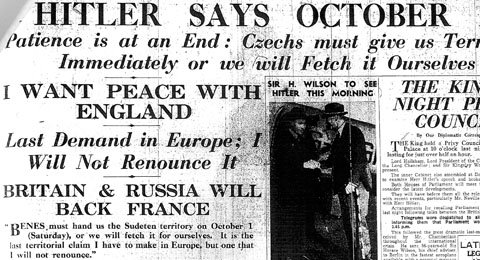
Hitler made a speech in Berlin last night in which he repeated the demands he made at Godesberg. Again, Czechoslovakia has until 1 October to cede the Sudetenland to Germany: otherwise he threatens to take it forcibly. But at least he promises that this is his last territorial claim in Europe. My copy of the Daily Mail headlines, p. 11, chops a bit off, so here’s the text:
HITLER SAYS OCTOBER 1
Patience is at an End: Czechs must give us Territory Immediately or we will Fetch it Ourselves
I WANT PEACE WITH ENGLAND
Last Demand in Europe: I Will Not Renounce It
BRITAIN & RUSSIA WILL BACK FRANCE
Today’s leading article in The Times (p. 13) calls this ‘tempestuous and rather offensive’, but thinks the most important point is that Hitler ‘did not seem absolutely to close the door to negotiation’.
Chamberlain would seem to agree, as he has already replied to Hitler’s speech by way of a public statement released at 1am this morning (Manchester Guardian, p. 9). He says that it seems ‘incredible’ that Europe should be plunged into war when both sides are largely in agreement (i.e., that Czechoslovakia should cede the Sudetenland). His interpretation is that:
It is evident that the Chancellor has no faith that the promises made will be carried out.
So Chamberlain assures Hitler that the British government is morally responsible for seeing that the Czechs will carry out their promises. He hopes that Hitler will accept this and negotiate a settlement for the Sudeten transfer to take place in a reasonable timeframe. The leader in the Daily Mail also favours continued diplomacy in these ‘four days which remain between civilisation and catastrophe’ (p. 10).
Parliament has been recalled — something which Labour has been agitating for for weeks — and will meet tomorrow (Manchester Guardian, p. 9). Chamberlain will likely get a hot reception. Attlee has written a letter to No. 10 urging firmness:
The British Government must leave no doubt in the mind of the German Government that it will unite with the French and Soviet Governments to resist any attack upon Czecho-Slovakia […] Whatever the risks involved, Great Britain must make its stand against aggression.
On the other side of the ideological divide, Churchill says exactly the same thing.
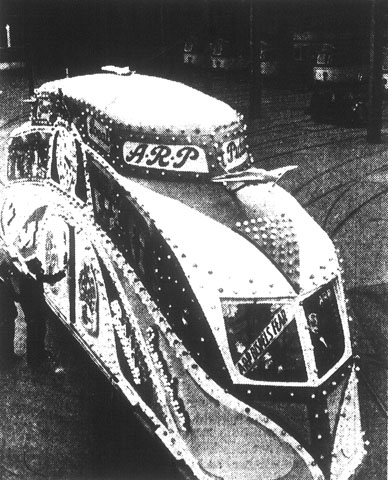
After ARP Sunday, there was a ‘sudden spurt’ in ARP preparations around the country yesterday, according to the Manchester Guardian (p. 10; the above ARP tram is from p. 7). Bolton’s schools, for example, will be closed for the rest of the week because they are being used as centres for the fitting of gas masks. Nine miles of trenches are going to be dug in Cardiff, enough to hold 24000 people, ten percent of the population. Morrison has appealed urgently for thousands of volunteers for ARP duties. The Home Office has decided to issue every household with a copy of a booklet called The Protection of Your Home Against Air Raids, and William Astor (Parliamentary Private Secretary to the Home Secretary) advises anyone who has a garden to build a shelter in it at once. ‘We may not have to wait until Saturday’ for war.
A leader in the Manchester Guardian on the subject says (p. 8):
The lesson that has been burned into our consciousness in the past weeks is that of the need for immediate preparedness. It holds whether peace lasts only a few days or a matter of months, for what the British people has at last realised is that we can safely count on no more than a breathing-space.
And preparedness is lacking: ‘our record on A.R.P. is, as a whole, bad’. The current activity is necessary and commendable — though authorities have been slow to recognise that high explosive is probably a greater danger than gas — but the public would be reassured to have a proper system of public air-raid shelters, rather than the hasty digging of trenches. As Haldane says, ‘we must have efficient A.R.P. or offer ourselves as a victim’.
Wm. Kenyon & Sons in Cheshire are doing their part, advertising ropes and rope ladders for use in ARP (Manchester Guardian, p. 16):

Eagle Star Insurance is offering home insurance which includes ‘Damage arising from Aircraft or articles dropped therefrom’:
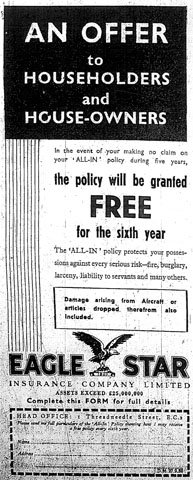
Admittedly, though, it’s not clear if this refers to war damage — there was a shocking accident earlier in the month at Edmonton, when an aeroplane crashed into a suburban street and killed 12 people (8 from 2 families). But there might be deliberate ambiguity, too.
Women and children have been evacuating Paris for Brittany and Normandy. Extra trains have been laid on, and authorities believe that the population of the inner city can be brought down from 3 million to only 500,000. Cities closer to the German frontier are already nearly empty of civilians (Daily Mail, p. 5).
At the request of the Food Defence Plans Department, the price of bacon, ham, butter, cheese, lard, cooking fat and margarine will remain fixed for the next 14 days (Daily Mail, p. 11).
RAF personnel have been recalled from leave. The men of the fighter squadrons and barrage balloon units of the Auxiliary Air Force have been called up, as have those in the Observer Corps and the anti-aircraft units of the Territorial Army. The air-raid warning system has been activated. All ‘Purely as a precautionary measure’ (Manchester Guardian, p. 9).
![]() This work is licensed under a Creative Commons Attribution-NonCommercial-NoDerivatives 4.0 International License.
Permissions beyond the scope of this license may be available at http://airminded.org/copyright/.
This work is licensed under a Creative Commons Attribution-NonCommercial-NoDerivatives 4.0 International License.
Permissions beyond the scope of this license may be available at http://airminded.org/copyright/.




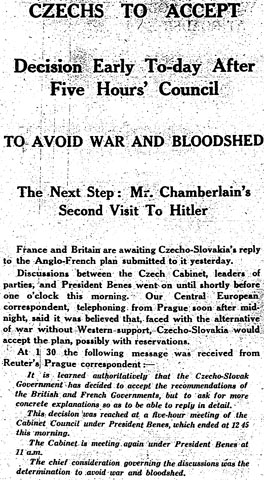
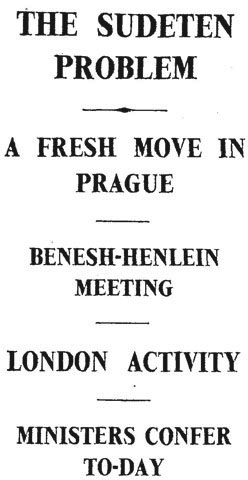
Now I get it. Gas masks are cheaper than bomb shelters. So distributing gas masks is an easy way to make a visible civil defence effort.
Yes, that’s definitely part of it. But it’s also that gas masks were deemed pretty effective too: cheap + effective = no brainer, really. And part of the argument for gas not being a big worry was precisely because it was relatively easy to guard against it, and British ARP was relatively sound in this area.
Pingback: Airminded · Post-blogging the Sudeten crisis: thoughts and conclusions